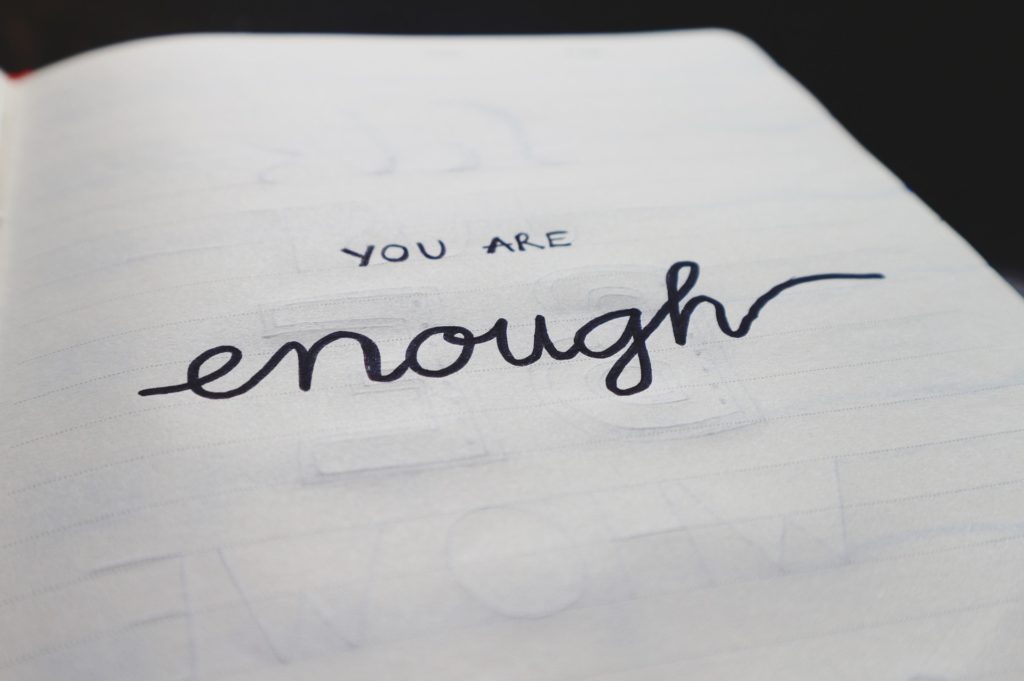During my difficult breakup, I started pinning inspirational quotes on Pinterest every morning as part of my ‘self-care rituals.’
Here’s an assortment of the things that I saved at the time:
- “The comeback is stronger than the setback.”
- “What if you simply devoted this year to loving yourself more.”
- “What a wonderful thought it is that some of the best days of our lives haven’t happened yet.”
- “If your compassion does not include yourself, it is incomplete.”
I liked to believe that the mere act of reading these quotes to myself and pinning them would somehow make me magically feel better. That if I read these things enough, at some point they’d all start to ‘stick’ — that I could miraculously alter a faulty way of thinking that’s been with me since childhood in the blink of an eye.
I liked to believe that the mere act of reading these quotes to myself and pinning them would somehow make me magically feel better.
I also adopted affirmations as a way of trying to imbue more positive ways of thinking (as well as a more positive attitude towards myself). Every month, I’d make a list of 15 affirmations that I’d read out loud in the morning. It was one of the many little rituals that I took on in order to try and keep myself motivated and sane.
Here’s the thing, though. Learning how to love yourself and have self-compassion is far, far, far more complex than pinning a Pinterest quote and reading some affirmations out loud. Sure, those things helped — in the moment that I was doing them. I’d feel a momentary sense of positivity and gentleness towards myself.
“Hell yes, I can be the kind of person who loves herself!”
The truth is, self-help books and women’s magazines make it sound like it’s such an easy thing to do. They lament the importance of things like looking in the mirror and saying “I love you” and push the idea that this is enough to make a difference in how we feel about ourselves.

But I don’t recall a single article telling me the truth — that for some of us, it’s not as simple as cooking a good meal, lathering our bodies in moisturiser and reading affirmations out loud. Self-love and self-compassion don’t happen overnight. It’s a process that takes a lot of self-awareness, work and, in most cases, therapy.
I know that the advice is well-meaning, but as someone who repeatedly tried these things in the past while waiting (in vain) to start feeling this thing I was meant to be feeling, I know that it can in many ways do more damage than good.
What is self-love?
Self-love, or self-compassion, is defined in Medical News as a construct that has three parts to it:
- Self-kindness (treating yourself with understanding and forgivingness and extending the same kindness and care to yourself that you would to a friend);
- Recognition of your place in shared humanity (an acknowledgement that no one is perfect and that all personal experiences are part of the larger human experience); and
- Mindfulness (being open, curious, and non-judging, not identifying with negative stories about yourself).
I started to understand it more when I began thinking to myself “Would I treat a friend this way?” and the answer would always be no. No, I would not berate a friend for making a mistake. No, I would not tell a friend she was stupid for feeling the way she did. No, I would not tell a friend that she was a lazy sod for wanting to spend some much-needed time at home instead of going to yoga. So, why was I treating myself in this way?
Does the above sound familiar?
It’s hard work
For some of us, it’s bloody hard to practise self-love. It’s not as simple as writing in your journal a few times or visualising yourself exuding love.
The good news is that it can be cultivated. When I think back to the way I was a few years ago, I’m amazed at the difference all of the work I’ve done has made. Now, if I make a mistake, yes – the negative voice does come in to start its usual “You idiot, how can you slip up like this” etc., but at the same time a far kinder, gentler voice also comes in and changes the narrative. “It’s okay, mistakes happen. You’re only human. You can take the lesson from this and move forward.”
Sounds far more like something you’d tell a friend, right?
But it took a lot of hard work to get to where I’m at right now, and it’s still something I struggle with on a regular basis.
So, how do you get there?
Well, depending on just how little self-compassion you have, I’d always recommend seeing a therapist to help you through this one. As someone who had very deep-seated negative self-talk, I know it would have been near impossible to have made the progress I’ve made without it.
But therapy aside, there are many things you can do that will help you to cultivate self-compassion. Here are a few suggestions to help you get started:
Think about how you treat your friends
This one helped the most when I was starting out. I didn’t quite grasp the concept of self-compassion until I started to think of it in terms of treating myself the way I’d treat a friend. So, the next time you make a mistake or are berating yourself for feeling a certain way, think of what you’d tell a close friend if they were talking to you about the same things.
Write those phrases out and read them to yourself. Repeat as often as you can.
Write a letter of support to yourself
I’ve found this to be a very empowering and soothing exercise. Find a time when you know you won’t have any interruptions and write a letter to yourself. Write as if you are talking to your best friend or think in terms of what you’d like to hear when you’re down. Be that best friend. Give yourself all the support that you need. Keep the letter handy and read it whenever you feel you need to.
Identify common non self-nurturing thoughts
Make a list of common negative thoughts that you have, and for each one find a self-nurturing alternative. Keep the paper with your list handy and the next time you feel a negative spiral read them to yourself.
Examples include:
“Nothing will ever change,” could be replaced with “I’m strong and capable of working towards my goals.”
“I’m not good enough,” could be replaced with “I have many unique capabilities and skills.”
“I’ll never meet someone,” could be replaced with “I’m worthy of love and respect.”
Become infinitely gentler with yourself
This one is a long process – well, for me it was and continues to be. If you’ve been your own harshest critic your whole life, you’re essentially having to reprogramme the way you think and feel about yourself.
I think part of this process is acknowledging that it will take time and being patient. Replace those self-defeating thoughts with more positive ones, but don’t criticise yourself for having them in the first place. Choose to be gentle with yourself every single day.
Employ a growth mindset
According to Stanford University psychologist Carol Dweck, there are two main modes related to learning: the growth mindset, which is the view that your intelligence is something you can grow or develop, or the fixed mindset, the belief that these are fixed and unchangeable.
Become more mindful of your own view of the world and try to employ more of a growth mindset. Stare challenges in the face, don’t give up, and try to find the lesson and meaning in any obstacles you may come across. Instead of falling into a cycle of self-criticism when you compare yourself with others, find inspiration in their successes and strengths.
Be a good parent…to yourself
Know the difference between being the bad parent (scolding yourself for mistakes, giving yourself grueling punishments etc.) and being the good parent (sticking to the things that will make you feel good, giving yourself words of encouragement, making sure you get an adequate amount of sleep and good nutrition etc.). Being a good parent means that you learn to take care of your inner child, which leads to having a better relationship with yourself.
This is a great article on how to heal and re-parent your inner child.
Think of starting therapy
I cannot emphasise how important this part was for me. Before therapy, I had no idea what it really meant to have self-compassion. It came through recognising how I’ve always been incredibly harsh on myself and how I would constantly berate myself for any perceived failures or inadequacies. It’s been a long and painful process, but I can finally say I’m starting to fully understand what it means to take care of yourself and love yourself – and how this is the route to also being able to share this love more fully with others.




